
Compost is a mixture of ingredients used as plant fertilizer and to improve soil's physical, chemical, and biological properties. It is commonly prepared by decomposing plant and food waste, recycling organic materials, and manure. The resulting mixture is rich in plant nutrients and beneficial organisms, such as bacteria, protozoa, nematodes, and fungi. Compost improves soil fertility in gardens, landscaping, horticulture, urban agriculture, and organic farming, reducing dependency on commercial chemical fertilizers. The benefits of compost include providing nutrients to crops as fertilizer, acting as a soil conditioner, increasing the humus or humic acid contents of the soil, and introducing beneficial microbes that help to suppress pathogens in the soil and reduce soil-borne diseases.

Straw is an agricultural byproduct consisting of the dry stalks of cereal plants after the grain and chaff have been removed. It makes up about half of the yield of cereal crops such as barley, oats, rice, rye and wheat. It has a number of different uses, including fuel, livestock bedding and fodder, thatching and basket making.

Permaculture is an approach to land management and settlement design that adopts arrangements observed in flourishing natural ecosystems. It includes a set of design principles derived using whole-systems thinking. It applies these principles in fields such as regenerative agriculture, town planning, rewilding, and community resilience. The term was coined in 1978 by Bill Mollison and David Holmgren, who formulated the concept in opposition to modern industrialized methods, instead adopting a more traditional or "natural" approach to agriculture.
No-dig gardening is a non-cultivation method used by some organic gardeners. The origins of no-dig gardening are unclear, and may be based on pre-industrial or nineteenth-century farming techniques. Masanobu Fukuoka started his pioneering research work in this domain in 1938, and began publishing in the 1970s his Fukuokan philosophy of "do-nothing farming" or natural farming, which is now acknowledged by some as the tap root of the permaculture movement. Two pioneers of the method in the twentieth century included F. C. King, Head Gardener at Levens Hall, South Westmorland, in the Lake District of England, who wrote the book "Is Digging Necessary?" in 1946, and a gardener from Middlecliffe in the UK, A. Guest, who in 1948 published the book "Gardening Without Digging". The work of these gardeners was supported by the Good Gardeners Association in the UK. No-dig gardening was also promoted by Australian Esther Deans in the 1970s, and American gardener Ruth Stout advocated a "permanent" garden mulching technique in Gardening Without Work and no-dig methods in the 1950s and 1960s.

Vermicompost (vermi-compost) is the product of the decomposition process using various species of worms, usually red wigglers, white worms, and other earthworms, to create a mixture of decomposing vegetable or food waste, bedding materials, and vermicast. This process is called vermicomposting, with the rearing of worms for this purpose is called vermiculture.
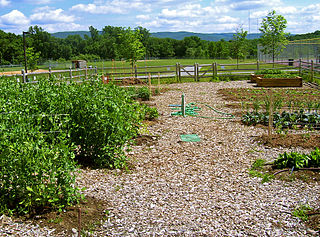
The following outline is provided as an overview of and topical guide to organic gardening and farming:
Vegan organicagriculture is the organic production of food and other crops with minimal animal inputs. Vegan organic agriculture is the organic form of animal-free agriculture.
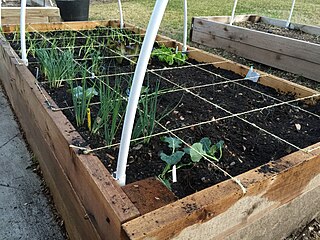
Square foot gardening is the practice of dividing the growing area into small square sections, typically 1 foot (30 cm) on a side, hence the name. The aim is to assist the planning and creating of a small but intensively planted vegetable garden. It results in a simple and orderly gardening system, from which it draws much of its appeal. Mel Bartholomew coined the term "square foot gardening" in his 1981 book of the same name.
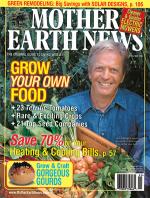
Mother Earth News is a bi-monthly American magazine that has a circulation of 500,520 as of 2011. It is published in Topeka, Kansas.
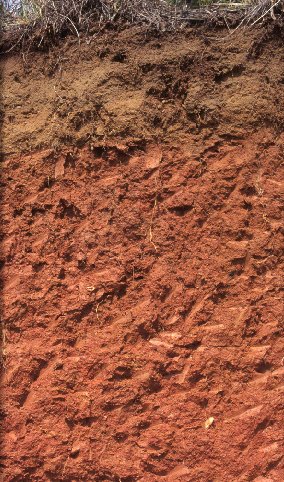
Ultisol, commonly known as red clay soil, is one of twelve soil orders in the United States Department of Agriculture soil taxonomy. The word "Ultisol" is derived from "ultimate", because Ultisols were seen as the ultimate product of continuous weathering of minerals in a humid, temperate climate without new soil formation via glaciation. They are defined as mineral soils which contain no calcareous material anywhere within the soil, have less than 10% weatherable minerals in the extreme top layer of soil, and have less than 35% base saturation throughout the soil. Ultisols occur in humid temperate or tropical regions. While the term is usually applied to the red clay soils of the Southern United States, Ultisols are also found in regions of Africa, Asia, and South America.

Organic horticulture is the science and art of growing fruits, vegetables, flowers, or ornamental plants by following the essential principles of organic agriculture in soil building and conservation, pest management, and heirloom variety preservation.

Container gardening or pot gardening/farming is the practice of growing plants, including edible plants, exclusively in containers instead of planting them in the ground. A container in gardening is a small, enclosed and usually portable object used for displaying live flowers or plants. It may take the form of a pot, box, tub, basket, tin, barrel or hanging basket.
Lawrence Donegan Hills was a British horticulturalist and writer. In 1954, he founded the Henry Doubleday Research Association in Bocking, near Braintree, Essex. By the time he retired in 1986, HDRA was the largest body of organic gardeners in the world and had moved to Ryton-on-Dunsmore, near Coventry.

Ehrenfried Pfeiffer was a German scientist, soil scientist, leading advocate of biodynamic agriculture, anthroposophist and student of Rudolf Steiner.
In permaculture, sheet mulching is an agricultural no-dig gardening technique that attempts to mimic the natural soil-building process in forests. When deployed properly and in combination with other permaculture principles, it can generate healthy, productive, and low maintenance ecosystems.
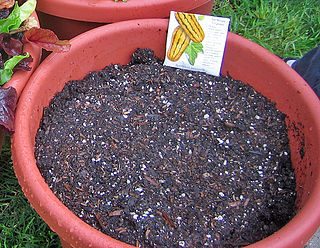
Potting soil or growing media, also known as potting mix or potting compost (UK), is a substrate used to grow plants in containers. The first recorded use of the term is from an 1861 issue of the American Agriculturist. Despite its name, little or no soil is usually used in potting soil.
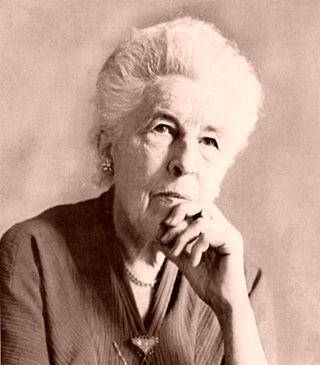
Ruth Imogen Stout was an American author best known for her "No-Work" gardening books and techniques.

Hügelkultur, literally mound bed or mound culture, is a horticultural technique where a mound constructed from decaying wood debris and other compostable biomass plant materials is later planted as a raised bed. Adopted by permaculture advocates, the technique helps to improve soil fertility, water retention, and soil warming, thus benefitting plants grown on or near such mounds.
Will Bonsall is an American author, seed saver and veganic farmer who lives in Maine. He is a regular speaker about seed saving, organic farming and veganic farming.













